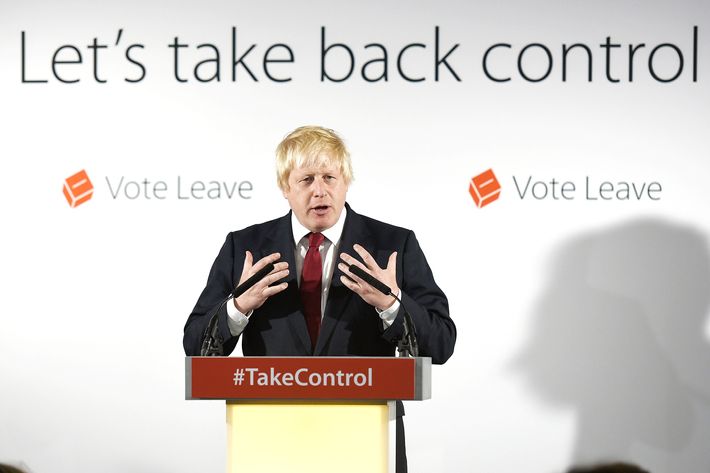
The United Kingdom wants out. On Thursday night, 52 percent of Britons voted for the U.K. to begin divorce proceedings with the European Union, in one of the most dramatic exercises of direct democracy in human history. The world’s largest economy is in uncharted waters. Europe’s postwar political order stands on trembling ground. No one knows what happens next. The defining feature of Brexit is uncertainty. So, take the following list of what to expect with a couple of fat grains of English sea salt:
A lot of red arrows in stock tickers.
This one you can take to the bank: The pound is getting pounded. The S&P 500 has hit a session low. World Markets are tumbling, and the Dow Jones Industrial Average fell 500 points in early trading.
The breakup of the United Kingdom.
Scotland voted overwhelmingly to remain in the European Union, opting for “Remain” by a margin of 62 to 38 percent. The region’s desire to remain within the EU is already galvanizing support for a second referendum on Scottish independence.
“It is a statement of the obvious that the option of a second independence referendum must be on the table and is on the table,” Scotland’s First Minister Nicola Sturgeon said at a news conference Friday. “As things stand, Scotland faces the prospect of being taken out of the EU against her will. I regard that as democratically unacceptable.”
A similar mood prevails in Northern Ireland, which also voted to remain in the EU. The region is the only part of the U.K. that shares a land border with an EU nation, regular Ireland. Northern Ireland’s leaders want to stay in the union and keep that border porous — and see a referendum on unification with Ireland (a.k.a. “border poll”) as the simplest way to accomplish both.
“The British government now has no democratic mandate to represent the views of the North in any future negotiations with the European Union,” Northern Ireland’s Deputy First Minister Martin McGuinness told Irish broadcaster RTE. “And I do believe that there is a democratic imperative for a ‘border poll’ to be held.”
Donald Trump to say the worst possible thing.
The European Union was formed in hopes of stifling the political forces that gave rise to both World Wars. Speaking at the opening of his company’s new golf course in southern Scotland, the Republican nominee argued that it would be great if the EU broke up, because that way immigrant-hating Germans would feel more nationalistic.
“Well, it looks like it’s on its way,” Trump said, when asked if he thinks Brexit marks the beginning of the EU’s end. “I have a lot of friends living in Germany that have always been very proud Germans, to a level you wouldn’t believe … now those same people are leaving Germany because of the tremendous influx of people.”
Trump also congratulated Scotland on taking its country back — despite the region’s overwhelming support for Remain.
He then noted that the falling pound — which has, at least temporarily, reduced the wealth of all Britons — would be great for his golf resort.
This guy to become Britain’s prime minister.

British prime minister David Cameron was the face of the “Remain” campaign. A majority of British voters just spat in that face. Now Cameron has announced plans to resign this autumn.
Enter Boris Johnson, London’s former mayor and the U.K.’s most popular politician — outside of London, anyway. Cameron’s Conservative Party has been sharply divided between right-wing nationalists pushing for British independence and cosmopolitan conservatives sympathetic to the concerns of pro-European economic elites. As his tenure in London drew to an end, Johnson bucked the will of his city and prime minister and cast himself as the figurehead of his party’s nationalists. He is now emerging as an early favorite to succeed Cameron ahead of the 2020 elections.
Johnson is a New York–born, sliver-spoon-slurping populist known for his wild hair, political incorrectness, anti-immigrant demagoguery, and shameless lies. If that description reminds you of a certain American politician, you are not alone.
A global recession?
Take this one with a pound of salt, but asset manager T. Rowe Price tells Bloomberg the chance of Brexit sparking a global recession is “above 50 percent.”
“Those who believe Brexit is a U.K. problem are misunderstanding the impact it will have globally. They’re forgetting the impact that Greece had – and Greece is much smaller than the U.K. and not a financial center,” Arif Husain, head of international fixed income at T. Rowe Price, told the outlet. “The vote to leave could result in a global recession.”
Marine Le Pen to have a good day.
The Brexit vote could give momentum to France’s far-right, anti-EU Front Nationale Party and its presidential candidate, Marine Le Pen.
“Victory for freedom!” Le Pen tweeted in reaction to the results. “As I have been asking for years, now we need to have the same referendum in France and in the countries of the EU.”
A recent poll showed Le Pen garnering twice the support of France’s socialist president, François Hollande. France will hold its next presidential election in spring 2017.
Young Brits to shoot their elders angry looks.
Polls suggests a stark age gap in support for Brexit. Young people, who are more likely to be comfortable with immigration — and far more vulnerable to economic turmoil than elderly pensioners — wished to remain in EU. Support for Brexit was heavily concentrated among those who won’t have to live all that long with its consequences.
“The younger generation has lost the right to live and work in 27 other countries. We will never know the full extent of the lost opportunities, friendships, marriages and experiences we will be denied,” wrote an exceptionally eloquent reader of the Financial Times. “Freedom of movement was taken away by our parents, uncles, and grandparents in a parting blow to a generation that was already drowning in the debts of our predecessors.”
Hung-over Brits in “Leave!” T-shirts muttering, “What have I done?”
The overriding concern for supporters of “Leave” was regaining control of their nation’s borders. Under EU law, the U.K. is required to accept an unlimited number of economic migrants from less wealthy European states. At a time of low growth and fiscal austerity, working-class Britons saw the past years’ influx of Polish, Croatian, and Portuguese migrants as a threat to both their cultural coherence and welfare system.
Which is to say: While xenophobia was a driving impetus of the leave movement, that fear of others is inextricable from economic anxieties. One of the central claims of the “Leave” campaign, featured in a wave of television advertisements, was that the $350 million the U.K. sends to the European Union each week would be redirected to the National Health Service. The pitch: No payments to Brussels + fewer immigrants = secure social benefits for British citizens.
On Friday, Nigel Farage, leader of the far-right UK Independence Party — which led the push for Brexit — admitted that the NHS will not actually be receiving an additional $350 million a week.
No one can be certain of the long-term economic effects of Thursday’s vote. A lot depends on the terms of the divorce — what kind of alternate free-trade agreements the U.K. is able to broker.
But Britain is a small island that imports a lot of stuff. Being a member of one of the world’s largest free-trade zones has made that stuff cheaper. And as Vox notes, being an EU member brought multinational companies (and thus jobs) to the U.K. This was because the EU’s common laws and regulations allow your average enormous corporation to maintain a single headquarters for the entire continent. And because English is the most widely spoken language in Europe, a lot of those headquarters end up in England.
This setup allowed the city of London to be Europe’s financial center. Which is to say: The biggest industry in the U.K. needs access to the common market in order to thrive. And a thriving finance industry isn’t just good for the plutocrats in Kensington — it also generates tax revenues that support social services in the British countryside.
Thus, the U.K. government has estimated that Brexit would cause the nation’s economy to be between 3.8 and 7.5 percent smaller by 2030. The “Leave” camp hoped to share the current economic pie among smaller, more homogenous group of people. Instead, they may find themselves stuck with smaller slices.
Layoffs in London.
Per Bloomberg:
JPMorgan Chase & Co. Chief Executive Officer Jamie Dimon, who has 16,000 employees in London and other British cities, said this month a vote to leave could mean a quarter of those jobs might be cut. Morgan Stanley and HSBC have made similar noises.
Discussion of how the U.K. can weasel its way out of this.
The Brexit referendum is not legally binding. Parliament could simply reject it. However, there’s a widespread sense that bucking the will of the electorate would be political suicide. Still, Britain has a two-year window to negotiate the actual terms of Brexit. Once they arrive at those terms, the government could put them up for a referendum, giving voters one more chance to step back from the ledge.
Depressed bookkeepers.
Britain’s bookies made “Remain” an odds-on favorite, trusting that loss aversion would deliver an easy victory for the status quo, despite polls that predicted a close race.
Fraught negotiations between the U.K. and EU.
Britain may not want the EU’s immigrants or all of its economic regulations, but it does want preferential access to one of the world’s largest free-trade zones. The new U.K. government will push for an independent agreement with the EU akin to that enjoyed by Norway.
However, if the EU leadership cut Britain a sweetheart deal — allowing it to reap all of the benefits of membership without most of the costs — other EU members might head for the exits. There may be strong pressure to make an example of Britain. Plus, certain EU members stand to gain from a weakened London: Amsterdam would love to be the new financial center of Europe.
Anxious migrants.
There are currently 3 million EU nationals living in Britain — and 1.2 million Brits living in other EU nations. These individuals’ lives have been thrown into uncertainty. Whether they can remain in their present homes will depend on the terms of pending negotiations. But since xenophobia was the primary political impetus for Brexit, it’s possible many immigrants will be deported from the U.K.
Many more columns linking Brexit to Donald Trump.
Right-wing nationalism to continue its ascent unless or until elites find a way to engineer more inclusive growth.
In Britain, the richest 10 percent of the population is 850 times wealthier than the bottom 10 percent. Those who live in London’s richest neighborhoods live 25 years longer than those who live in poorest boroughs. Inequality throughout the U.K. has increased 47 percent since 1977. Tax and welfare changes enacted in the wake of the 2008 recession have made the poorest Britons significantly poorer.
Every mainstream economist in Britain loudly warned the population about the dire consequences of Brexit. The leaders of the nation’s top political parties all campaigned for “Remain.” Then more than 70 percent of the British public went to the polls — and a majority told the experts to piss off.
Human beings do have a bias toward averting loss. But that aversion means that when people feel themselves spiraling downward, they’ll take great risks to recover what they’ve lost — this is why gambling addicts double down. The British were offered a choice between the status quo and a risky bid to return to a lost Britain, one associated with greater prosperity and fewer immigrants. To keep other nations from making Britain’s choice, policymakers will need to give working people other options.






























